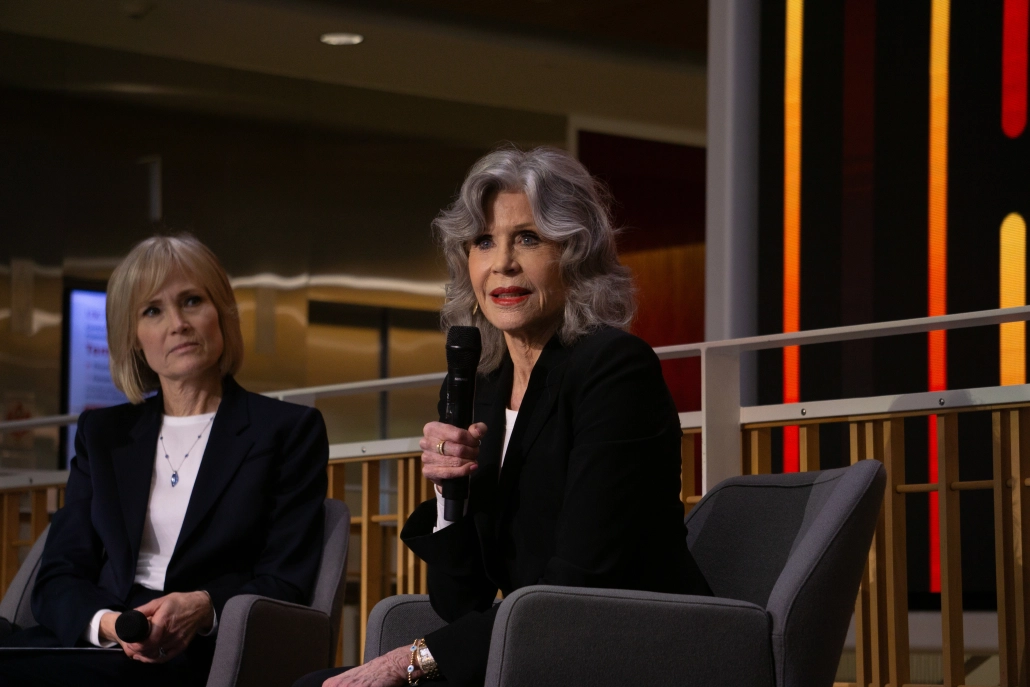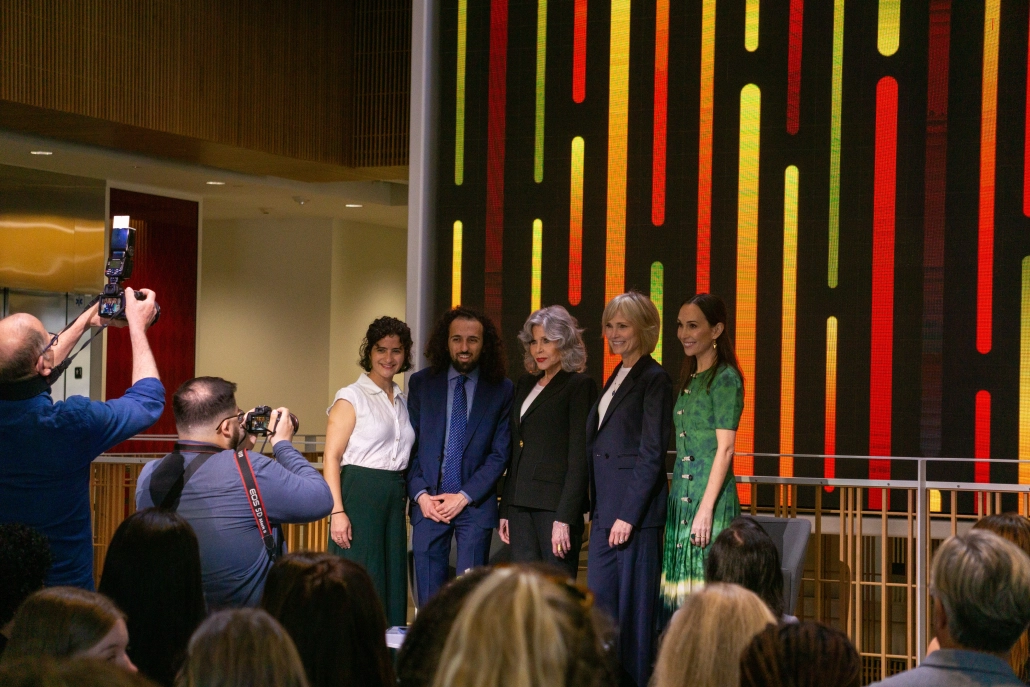Jane Fonda champions climate activism
Climate experts spoke with faculty at Annenberg Hall about political engagement.
Climate experts spoke with faculty at Annenberg Hall about political engagement.

The audience was packed at the “Temperature Check” event Thursday at Annenberg Hall where guest speakers offered an important message: The future of climate activism relies on storytellers and collective action.
The Center for Climate Journalism and Communications hosted the event as part of the University’s Earth Month celebrations. The discussions featured climate activist and actress Jane Fonda in conversation with Dean Willow Bay, followed by a panel with the Los Angeles Times climate columnist Sammy Roth, director of the Center for Climate Journalism and Communication Allison Agsten, and L.A. Times reporter Faith Pinho as the moderator.
Fonda, a vocal activist championing climate action through the Jane Fonda Climate Political Action Committee and Fire Drill Fridays, a collaboration with Greenpeace, spoke to community members to discuss the state of environmental advocacy today and the role individuals can play in a more sustainable future.
Climate scientists are in virtually unanimous agreement that climate change is real.
“There are not two sides to the story,” Fonda said.
The role of storytellers in shaping the narratives around climate change and how these narratives can inspire action was a recurring topic of discussion during the panel.
“The way you change mindsets is not through giving facts,” Fonda said. “It’s not through what you say to people. It’s how you make them feel, and stories are the best way to make people feel.”
Fossil fuels and the need to transition to alternative fuel sources were at the heart of the discussions throughout the event. Fonda emphasized the need to phase out fossil fuels by the middle of the century.
“Wounded beasts are truly dangerous, and the oil companies are wounded beasts — oil, gas and coal,” Fonda said. “They are running scared, and so they are really dangerous. They are doing all kinds of nefarious things to keep going.”
Agsten later weighed in on the role of storytellers, using fossil fuels as a prime example of where communicators are essential to inform the public and spread awareness to generate action.
“We have to tell that story convincingly, with all the facts in place, but also move people to listen and to action. The storytelling is essential,” Agsten said.
Roth spoke about the push that journalists and communicators sometimes feel to adopt a certain angle when reporting on climate issues, whether that be promoting solutions, inciting frustration and anger or eliciting a range of other responses. Ultimately, Roth says there is no one-size-fits-all solution and that it’s important to consider how stories resonate with different audiences.
“It’s important to have different types of storytellers telling different types of messages to different people,” Roth said.
Apart from storytelling, the road to a greener future involves political votes and strength in collective action, rather than individual action alone, Fonda said, who endorsed Biden for the 2024 presidential election, despite being furious with what she described as his failure to live up to some promises in the past.
“It’s not always front-page news, but he’s making possible the transition to the alternative green future,” Fonda said. “What electing Biden does is it provides us a playing field, a context, in which we can fight.”

Speaking about her climate advocacy work with Fire Drill Fridays, Fonda said she found that, of those who said they had never been involved in climate action, most said it was because they were never asked to do so.
“That was our target, the great unasked, and it started small, 50 people, and ended up with thousands,” Fonda said. “They were mostly women.”
Pinho also brought up the disconnect between climate awareness and action, referencing a study from Yale University that refers to this phenomenon as an “attitude-behavior gap,” where many Americans are willing to engage with climate action but few actually do.
“I think that the issue is so complex and so big that it’s really hard for people to know how to respond,” Agsten said.
Agsten added that climate change action also competes for our attention alongside many other immediate issues such as rent, family and bills, which can make it challenging to get people engaged.
“There are things knocking at people’s doors every day that are knocking a little bit louder than the environment,” Agsten said.
Gregory Wright, an L.A. resident and retiree, said he stays active by fighting for climate justice and attended the event to ask questions and share his ideas for a sustainable future in California and nationwide. He said the culture has to shift if society is to progress toward a sustainable future.
“I really appreciated that the speakers were there to listen — not just to speak, but they were ready to listen to people like me,” Wright said.
One challenge to sustainable progress is the idea that climate change can be solved with a single solution, such as nuclear energy. Roth explained that the complexity of climate change requires a range of efforts across the spectrum and encouraged people not to fixate on a singular strategy for solving the issue.
“Unless we want to place a really, really, really huge risky bet on the idea that you can get capitalism and politics to turn on a dime — and the fate of human civilization is at risk on that — it is not going to be just one thing,” Roth said. “It’s going to be a giant hodgepodge of lots and lots and lots of things.”
We are the only independent newspaper here at USC, run at every level by students. That means we aren’t tied down by any other interests but those of readers like you: the students, faculty, staff and South Central residents that together make up the USC community.
Independence is a double-edged sword: We have a unique lens into the University’s actions and policies, and can hold powerful figures accountable when others cannot. But that also means our budget is severely limited. We’re already spread thin as we compensate the writers, photographers, artists, designers and editors whose incredible work you see in our daily paper; as we work to revamp and expand our digital presence, we now have additional staff making podcasts, videos, webpages, our first ever magazine and social media content, who are at risk of being unable to receive the support they deserve.
We are therefore indebted to readers like you, who, by supporting us, help keep our paper daily (we are the only remaining college paper on the West Coast that prints every single weekday), independent, free and widely accessible.
Please consider supporting us. Even $1 goes a long way in supporting our work; if you are able, you can also support us with monthly, or even annual, donations. Thank you.
This site uses cookies. By continuing to browse the site, you are agreeing to our use of cookies.
Accept settingsDo Not AcceptWe may request cookies to be set on your device. We use cookies to let us know when you visit our websites, how you interact with us, to enrich your user experience, and to customize your relationship with our website.
Click on the different category headings to find out more. You can also change some of your preferences. Note that blocking some types of cookies may impact your experience on our websites and the services we are able to offer.
These cookies are strictly necessary to provide you with services available through our website and to use some of its features.
Because these cookies are strictly necessary to deliver the website, refusing them will have impact how our site functions. You always can block or delete cookies by changing your browser settings and force blocking all cookies on this website. But this will always prompt you to accept/refuse cookies when revisiting our site.
We fully respect if you want to refuse cookies but to avoid asking you again and again kindly allow us to store a cookie for that. You are free to opt out any time or opt in for other cookies to get a better experience. If you refuse cookies we will remove all set cookies in our domain.
We provide you with a list of stored cookies on your computer in our domain so you can check what we stored. Due to security reasons we are not able to show or modify cookies from other domains. You can check these in your browser security settings.
These cookies collect information that is used either in aggregate form to help us understand how our website is being used or how effective our marketing campaigns are, or to help us customize our website and application for you in order to enhance your experience.
If you do not want that we track your visit to our site you can disable tracking in your browser here:
We also use different external services like Google Webfonts, Google Maps, and external Video providers. Since these providers may collect personal data like your IP address we allow you to block them here. Please be aware that this might heavily reduce the functionality and appearance of our site. Changes will take effect once you reload the page.
Google Webfont Settings:
Google Map Settings:
Google reCaptcha Settings:
Vimeo and Youtube video embeds:
The following cookies are also needed - You can choose if you want to allow them:
